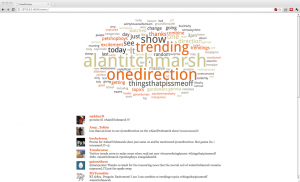One of the latest ideas we are working on for the new project is looking at how providing different amounts of information affects our perception of content. Even in pure implementation terms this is interestingly unlike any of the work I’ve done in the last few years, most of which was simulation based. “Code a simulation, run the simulation, analyse the results” has been a pattern of work since the beginning of my PhD and beyond. This recent idea however needs us to essentially survey a large number of people, so rather than just coding some command-line simulation in C/C++ (or god-forbid, Fortran) that only one or two people might use, I’m building a web based system that (hopefully) will have many hundreds of people interact with it.
From the fact that this website is just a basic wordpress install with very few changes to the default theme you can probably tell that I am not a web developer. In the recent past I’ve very rarely had any call to do anything web-based beyond just keeping a personal (static HTML + CSS) home page up to date here at the school. To suddenly move into building a dynamic website that does a lot of complicated database stuff and interfaces with other services via OAuth is quite a jump. Fortunately, it’s been a relatively easy jump thanks to django.
I’m not going to ramble on about what django is (basically a python web framework), if you haven’t heard of it go check it out. What I am going to do is recommend it highly. It is so simple, so quick and so powerful that implementing a web project with it is dreamy. We first discussed this research idea sometime at the beginning of the month, and I started coding it sometime around the 16th. Since then I’ve actually spent a week working on another project (and the ever present SocialNets deliverables for the EU), but I’m still massively into implementation to the point where I’m confident of having a site ready to beta test this week. Which I think is pretty good going for someone with as little web programming skill as I have!
So, there. Django. Try it out, it’s aces.
p.s - the project will hopefully be open to the public at some point in the future, once it is, I’ll post here.
